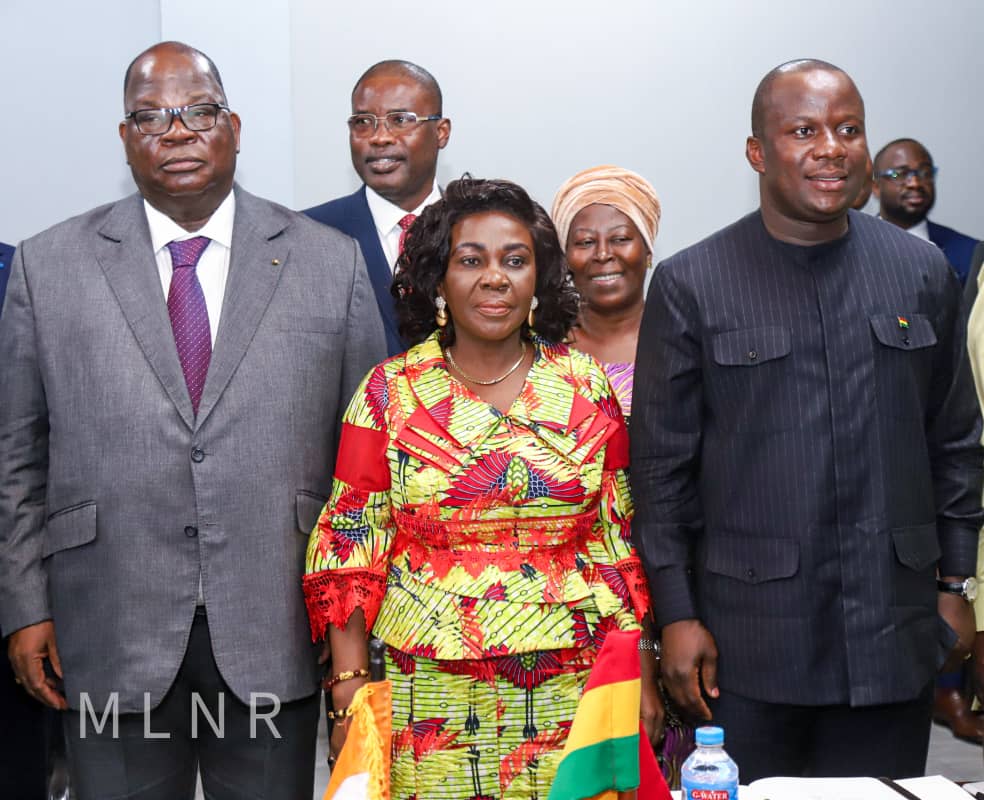
 As part of efforts at resolving trans-boundary issues on water pollution, in respect of the Tano and Bia rivers, which flow through Ivorian waters, the government has taken the necessary step to seek collaboration with the Ivorian government.
As part of efforts at resolving trans-boundary issues on water pollution, in respect of the Tano and Bia rivers, which flow through Ivorian waters, the government has taken the necessary step to seek collaboration with the Ivorian government.
Officials from the ministries of Lands and Natural Resources, Sanitation and Water resources, Defence and Environment Science Technology and Innovation yesterday met a high powered delegation from Cote d’Ivoire to discuss and fine-tune protective measures.
The Minister of Lands and Natural Resources, Samuel Abu Jinapor, who co-chaired the meeting with the Sanitation and Water Resources Minister, Cecilia Abena Dapaah, informed the Ivorian delegation that there had been a lot of challenges in protecting the country’s wetlands.
Mr Jinapor, however, stressed that government had not relented for once, as President Nana Addo Dankwa Akufo-Addo keeps waging war against illegal mining in the country.
He further told the delegation that the Ghanaian government had adopted a two-pronged approach to fighting illegal mining, popularly known as galamsey, which is the main source of water pollution.
The two-pronged approach, he said, involves law enforcement and reformation. To effectively do that, both governments mooted the declaration of river bodies as red zones to mining.
A common approach, Mr Jinapor said, would also be the involvement of military operations such as Operation Halt, an initiative geared towards riding the rivers off illegal miners.
 Conclusiveness
Conclusiveness
The Lands Minister said although illegal mining continues to pose a threat on the countries river bodies, he was optimistic that out of the deliberations, they would be able to come to a firm conclusion in resolving issues of water pollution in both countries.
He hoped to work closely with all stakeholders to come to grips on the matter plaguing both countries.
For her part, Cecilia Abena Dapaah noted that water is very central to the wellbeing of people around the world, as it is for both countries. She stressed the need to take up the Sustainable Development Goals (SDG) 6, which advocates clean water and sanitation for all.
She also hoped that this bilateral meeting would help both countries take cognisance of the far-reaching effects of a waterless world, and make concrete decisions that will help both countries.
Government, under the stewardship of President Nana Addo Dankwa Akufo-Addo, she said, is very passionate about promoting good neighbourliness by advocating unity and cooperation between countries.
She indicated that the mismanagement of water resources could result in pollution, resulting in the negative impact on human lives, aquatic life, irrigation and industry.
Mrs Dapaah added that it can cause sedimentation, which might lead to low carrying capacity, resulting in flooding, with its attendant loss of farms, lives and property.
 Transboundary
Transboundary
Mrs Dapaah said water resources are often shared with other neighbours, saying “the Volta River is shared with Cote d’Ivoire, Benin, Burkina Faso, Mali and Togo, with Ghana having 43 percent downstream.”
The Tano, which is a transboundary river, she added, splits between Côte d’Ivoire, seven percent, and Ghana, 93 percent, while Bia is about 69 percent for Cote d’Ivoire, and 31 percent in Ghana.
For his part, the Ivorian Minister of Water and Forestry, Laurent Tchagba, who led the delegation, underscored the need for both countries to collaborate to address challenges facing the water bodies.
Mr Tchagba also expressed his gratitude for a warm reception from all participating ministries. He said the issue of water is important in the history of both countries as it binds them in one way or the other.
He expressed the hope that, together, both countries will be able to confer on issues, and resolve the common challenge.





